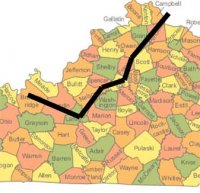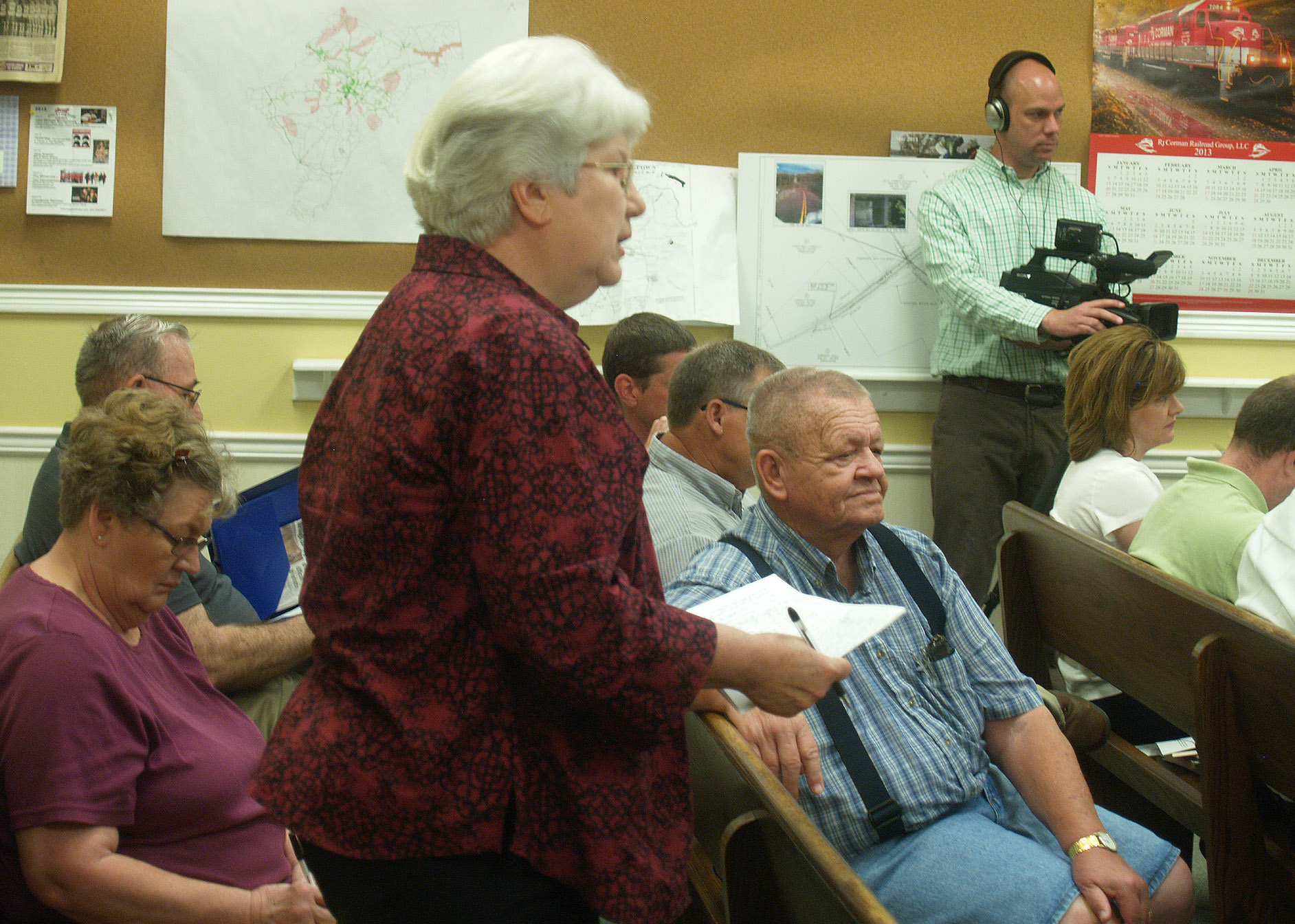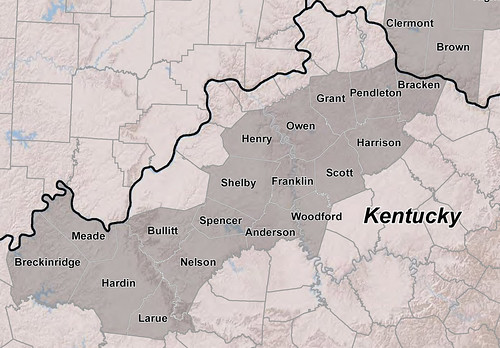Bluegrass Pipeline will cut across Kentucky

As many as a 18 Kentucky counties (see map) are within the possible path of a new pipeline that would carry natural gas liquids from the fracking fields of Pennsylvania, West Virginia and Ohio to processing plants and export terminals along the Gulf Coast.
The 24-inch pipeline would enter Kentucky from Ohio about 30 miles east of Cincinnati and go in a southwesterly direction through central Kentucky before connecting with an existing pipeline in Hardinsburg, in Breckinridge County.
Company representatives already are acquiring the rights to survey land and possibly buying easements in several counties, including Nelson, Franklin and Woodford where landowners are beginning to organize to get elected officials to address their concerns.
Some Nelson Countians took their concerns to their local fiscal court on June 4.
 Mary Ann Chamberlain, whose family has been farming in Nelson County for eight generations, said she has concerns about the potential for contamination of water and soil, and the danger of explosions. Others were concerned about the way landowners have been treated by company representatives.
Mary Ann Chamberlain, whose family has been farming in Nelson County for eight generations, said she has concerns about the potential for contamination of water and soil, and the danger of explosions. Others were concerned about the way landowners have been treated by company representatives.
“This affects a lot more people than those whose land it runs across,” Chamberlain said.
Sister Claire McGowan said that what’s at stake is “more than an individual property rights issue. It’s the well-being of the whole community.”
The pipeline would be built by a partnership between the Oklahoma-based Williams company and Houston-based Boardwalk Pipeline Partners. Both are large companies with thousands of miles of existing pipeline across the United States, including Kentucky.
Chamberlain has research the safety records and what she has found about Williams leaves her frightened.
Anderson County KFTC member Roger Rawlings also reminded readers in his recent Lexington Herald-Leader op-ed that the impacts of the pipeline would go far beyond those whose land is crossed.
“We won’t know for some time whether the pipeline will actually come our way. Maybe it will bypass our property, as maybe it will bypass yours. But this only means that other Kentuckians will be targeted instead – our neighbors and yours, either nearby neighbors or neighbors a bit farther away,” Rawlings wrote. “The consequences will be much the same for every Kentuckian.”
He also described what has happened in northern Pennsylvania where he and his wife lived several decades ago – an unspoiled area where the well water then was safe to drink. But now it is in the heart of areas where fracking is used to extract the natural gas and related products that will be piped to the Gulf Coast – as much as 400,000 barrels a day.
According to Rawling, his former neighbors report that:
Large energy companies have forced their way across the hills and down into the valleys. Huge trucks roar along the country lanes; strange drilling rigs rise out of the land; and large sums of money change hands.
The companies drive shafts deep into the earth, pumping in high-pressure chemicals that blast the subterranean rock layers apart. Then equipment at the surface gathers the stew of natural gas and contaminants that rises from deep underground. In the process, the earth and water and air have become dangerously polluted.
One of the unknowns is whether the company will have and use eminent domain to cross land where it’s unable to buy a right-of-way. That depends on whether the pipeline is only for private use or is classified as a common carrier, accessible for use by other companies. As a common carrier, it would have eminent domain powers granted to it by federal and state legislative bodies, according to Tom FitzGerald with the Kentucky Resources Council.
Nelson County Commonwealth’s Attorney Terry Geoghegan told the fiscal court that he assumes the company will have and need to use eminent domain to complete its route.
“They’ll have to [use eminent domain] if they expect to get through Kentucky,” said Magistrate Jerry Hahn, who added that many of his Nelson County constituents don’t want the pipeline on their land or in their community.
Geoghegan said some landowners have been offered a $50 gift card to allow the company on their land to survey. Allowing a survey may sound harmless, he said, and no guarantee of the final route of the pipeline, but likely something landowners will later regret.
Geoghegan was approached by the company and turned them away. He already has two crude oil pipelines across this farm – one dating back to the 1930s that existed when he bought the farm, and a second put in a few years ago using the same easement.
However, it’s not known how many landowners have signed leases. Some Nelson County residents at the fiscal court meeting knew of neighbors who had accepted the company’s offer. In other pipeline cases, a condition of the lease has been to not talk about it.
At this point, many think that the company’s strategy is to secure as many leases as possible in as direct a route as possible within the wide swath shown on the map. They would connect their leases by using eminent domain.
Recent News
Kentucky’s past legislative session showed alarming trend toward government secrecy
Churchill Downs takes more than it gives. That's why the Kentucky Derby is a no-go for me
‘We must never forget.’ Kentucky town installs markers for lynching victims.
Featured Posts
TJC Rolling Out The Vote Tour – a KFTC Reflection Essay
KFTC Voter Empowerment Contractor Reflection Essay
Voting is Power
Archives
- Home
- |
- Sitemap
- |
- Get Involved
- |
- Privacy Policy
- |
- Press
- |
- About
- |
- Bill Tracker
- |
- Contact
- |
- Links
- |
- RSS



Add new comment